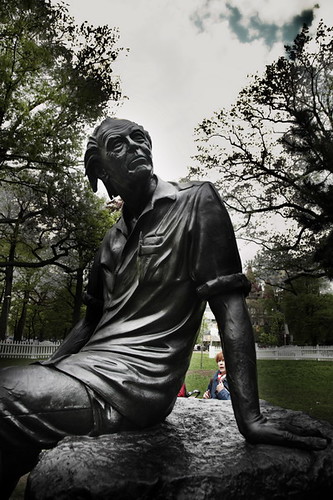
Well, tonight's the night. The Griffin Prize for poetry will be announced, and of course I'm keeping my fingers crossed for Insomniac Press author, and friend, David W. McFadden. David gave a wonderful reading at the Macmillan Theatre and, despite his famous shyness, he seemed completely at home on the same stage as John Ashbery and the other heavy-weights, including Korean poet and freedom fighter Ko Un, who recieved the Griffin Lifetime Achievement Award last night to a standing ovation after a very moving tribute from poet Robert Hass. When he finally took to the podium, David's reading was so warm, funny, engaging, and entertaining, it seemed natural that his should be the final reading of what was a very wonderful night of poetry all around.
Over the weekend both the Ottawa Citizen and the Toronto Star ran profiles of David, saying many wonderful things about him and his book
Why Are You So Sad? Selected Poems of David W. McFadden.
In the Toronto Star, Vit Wagner wrote:
It seems a curious coincidence Toronto poet David W. McFadden, a voracious reader since childhood, has lately been gorging on the prose fiction of Samuel Beckett.
Beckett, in addition to being one of the 20th century's greatest literary giants, famously shunned all displays of public recognition, even to the point of hiding out in Tunisia in 1969 when he could have been in Stockholm accepting the Nobel Prize for Literature.
It's unlikely McFadden will perform a similar disappearing act should he happen to be the Canadian winner of the $50,000 Griffin Poetry Prize on Wednesday – even if he does admit to being entirely unnerved by finding his name on the shortlist when it was announced last month.
"I have no idea why, but I had anxiety like I've never had before in my life," he allows, seated in a comfortable armchair during an interview earlier this week at Ben McNally Books. "I'm just a shy guy, I guess, but there has to be a lot more to it than that."
So great was McFadden's torment he privately began to fantasize the winning cheque would end up in the hands of one of this year's other two Canadian nominees, Robin Blaser or Nicole Brassard. (The international portion of the prize, also $50,000, will be awarded to one of John Ashbery, Elaine Equi, César Vallejo or David Harsent.)
"I so dreaded winning because I only have to give a speech if I win," he says. "I was constantly upset for three or four weeks, but I'm pretty relaxed now."
Relaxed maybe, but no less ambivalent.
You can read
the whole article here.
And in the Ottawa Citizen, Donna Bailey Nurse wrote:
The collection illustrates McFadden's unique sensibility -- an extraordinary alertness to his surroundings, agitated by a hyperactive, surreal imagination, and deep anxieties regarding mortality and the passage of time. He is a relentless observer, and as if to symbolize this role, he wears a giant eyeball ring that stared boldly at me throughout our conversation.
McFadden has published several novels, short stories and plays and received his most popular success with two series of travel books, one involving tours around the Great Lakes and another, Innocent Abroad, which conveys the reader to Newfoundland, Ireland, Scotland and Cuba. Charming, whimsical, and full of quirky happenstance, McFadden's travel books illuminate his creative process -- the way he notices practically everything, and speedily transforms this experience into art. His celebration of the natural world and the commonplace likens him to the Romantic poets. Like William Blake, McFadden describes a world of innocence and experience, two states he attempts to reconcile.
You can read
the whole article here.
Good luck tonight, David. I'll be cheering for you.
Photo: Ingrid Paulson.






